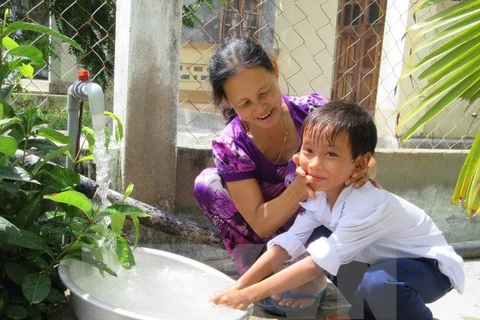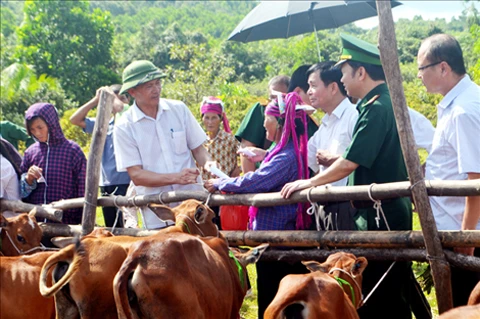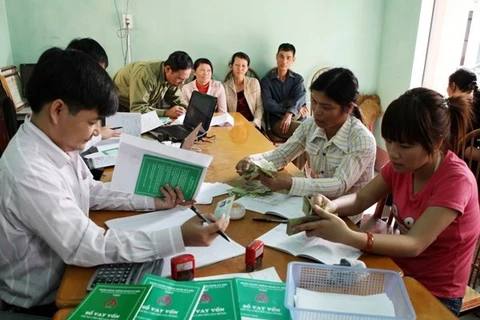Hanoi (VNA) – Overdue debts and deferred debts accounted for only 0.78 percent of total outstanding debts of the Bank for Social Policies, which demonstrated the quality of credit and the trust-worthy lending process.
2018 was a successful year of the Bank for Social Policies with new lending reaching 62.078 trillion VND, up nearly 7 trillion VND from the previous year. Overdue debts accounted for only 0.39 percent, the lowest among the entire system of credit institutions.
Vice director general of the bank Tran Lan Phuong granted an interview to VietnamPlus on the bank’s performance.
Rising resources for new lending
Can you give an overview of the remarkable achievements in 2018 that the Bank for Social Policies had made in implementing its political tasks?
Tran Lan Phuong : 2018 was an especially successful year for the bank, making it a bright example in the banking sector. The bank fulfilled the credit growth target assigned by the Prime Minister, contributing to the implementation of the national target programme on sustainable poverty reduction and new-style urban area building, and political stability at the grassroots level.
Specifically, total outstanding debt balance under social credit programmes reached 187.792 trillion VND as of December 31, 2018, up 16 trillion VND from 2017, while debt collection surpassed 45.888 trillion VND. As a result, new lending amounted to 62.078 trillion VND, an increase of nearly 7 trillion VND from the previous year. Nearly 6.7 million households classified as poor or entitled to social policies got loans from the bank.
Credit under social policies has reached 100 percent of communes, wards and towns in the country. Priority is given to localities in ethnic minority areas, remote and isolated areas, especially poor areas and border areas with the aim of supporting the development of production and businesses activities, thus creating jobs for over 243,000 labourers, helping nearly 6,000 labourers to get contracted jobs abroad and nearly 51,000 students from disadvantaged backgrounds to pursue education.
Besides, preferential credit supplied by the bank helped build more than 1.3 million clean water and hygiene works in rural areas, nearly 30,000 houses for impoverished households and more than 2,800 houses for beneficiaries of Decree 100/2015/ND-CP.
In particular, despite of the high credit growth, the rate of overdue debts remained low. As of December 31, 2018, overdue debts and deferred debts accounted for only 0.78 percent of total outstanding debts. Overdue debts accounted for only 0.39 percent, the lowest among the entire system of credit institutions. This fact demonstrated the quality of credit and the trust-worthy lending process.
Reports said that there was a high increase in the volume of money transferred from local budgets to the Bank for Social Policies for lending to poor households and beneficiaries of social policies in 2018. What does this mean for the bank?
Tran Lan Phuong : In the recent past, the capital entrusted to the bank from local budgets has increased continuously, contributing remarkably to the bank’s credit capital. At the conference reviewing 15-year operation of the bank, the Prime Minister requested localities to entrust part of their budgets to the bank to lend to beneficiaries of social policies as a supplement to poverty reduction credit.
As of December 31, 2018, total capital entrusted by localities to the Bank for Social Policies amounted to 11.809 trillion VND (accounting for 5.09 percent of the bank’s total capital), an increase of 2.764 trillion VND from 2017, the highest rise for 16 years. The concentration of resources has been a great help to the bank’s credit activities.
Specifically, party committees and administrations at all levels have better awareness about the role and position of social policy credit in realising the targets on sustainable poverty reduction, job generation, new rural area building and ensuring social security. The resources also help the bank to reduce its dependence on the central budget, thus better performing its tasks and role in credit provision for sustainable poverty reduction.
With increasing entrusted capital from local budget, local party committees and administrations also play a more active role in coordinating with the bank in the management and lending of the preferential credit sources.
Proposal on raising credit limit for students
At present the credit limits under some programmes targeting students and job generation remain low. What has the bank done to address this situation?
Tran Lan Phuong : While implementing credit programmes for students under Decision 157/2007/QD-TTg, the bank has several times proposed to relevant ministries and agencies that the credit limit be increased to suit the current prices, education costs and market changes (the current credit limit is 1.5 million VND per month for each student).
On September 18, 2018, the bank proposed to the Finance Ministry that the limit be raised to 2.5 million VND per month per student. The Finance Ministry is consulting relevant ministries and agencies before submitting the proposal to the Prime Minister.
Regarding the credit programme for job generation, in general production and business activities now need more capital to invest in expanding scale, applying technology and selling products under contracts and as part of value chains.
Besides, the current credit limit is no longer sufficient due to rising prices and costs of machinery, equipment, plants, breeding animals and input materials. Compared to 2014, the CPI has increased by more than 12.85 percent. In addition, many households and production and business establishments who need larger loans for development had to borrow from other credit organisations at higher interest rates.
The Bank for Social Policies has also asked the Ministry of Labour, Invalids and Social Affairs to consider and advise the Government in raising the limit for loans from the national fund for job generation to match current capital needs.
Intensifying the application of 4.0 technology
The Government has made 2019 the year of breakthrough to fulfil the 5-year plan (2016-2020). What plans has the bank made to follow this direction, particularly regarding the application of advances of the Fourth Industrial Revolution (4IR)?
Tran Lan Phuong : In 2019, the bank has designed plans to increase the outstanding credit balance to meet the targets assigned by the Prime Minister. The fulfilment of this task will ensure the credit quality for poor and near-poor households and beneficiaries of social policies, contributing to implementing the national target programme on sustainable poverty reduction and new rural area building.
The bank will continue to work hard to mobilise resources, with attention paid to entrusted capital from localities, mobilising deposits at commune-based transaction points and receiving deposits from savings and borrowing groups, thus meeting capital needs and ensuring liquidity of the bank’s system.
We will review social credit programmes and recommend to relevant authorities adjustments in eligible borrowers, credit limits, interest rates and loan terms in accordance with reality. The bank will give priority in lending to poor and near-poor households, areas with high rate of poverty, areas hit by natural disasters. We will accelerate disbursement of loans under social credit programmes, and improve the poor and social policy beneficiaries’ access to preferential capital sources, thus reducing shark loans in rural areas.
Advances of the 4IR have created opportunities for the banking sector to better serve customers. However, different groups of customers have different ways to access technology.
Customers of the Bank for Social Policies are mostly from disadvantaged backgrounds who live in rural and remote areas, thus there should be an appropriate approach to help them get familiar with new technology. The bank is preparing physical conditions and making use of its experience as well as knowledge and support gained through international cooperation towards selecting suitable software and helping customers use them.
The bank has started with the SMS banking service to help customers get familiar to new technology. Most of the bank’s customers currently hold saving accounts at the bank and use them to make monthly payment of debt and interest. This is the first step for the customers to get accustomed to payment through bank accounts, paving the way for them to use banking services.
Thank you.-VNA


























